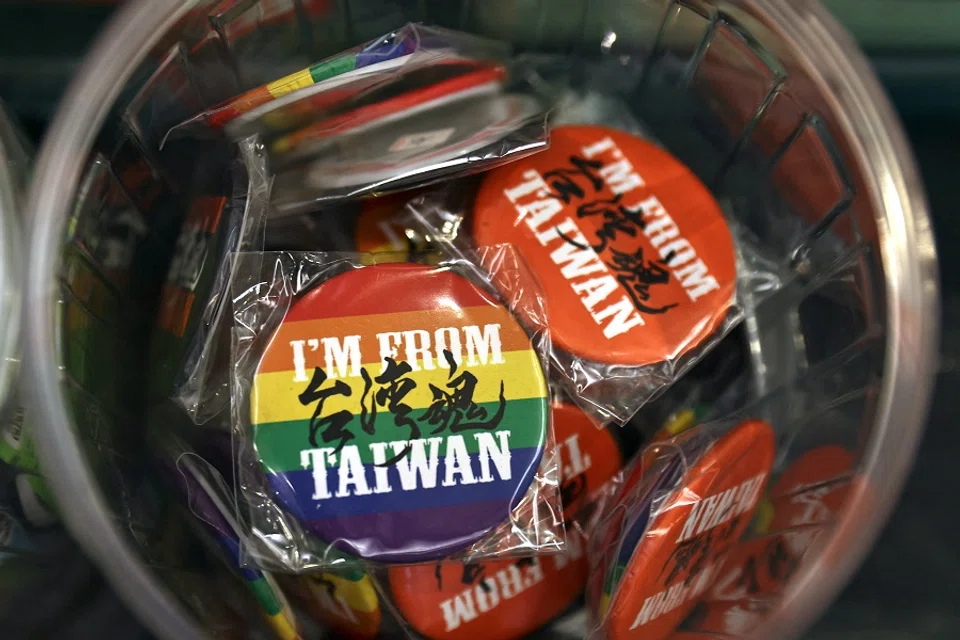Why it's right that US policy on Taiwan has not changed
US academic Wu Guo explains that the US and China have fundamentally different interpretations of the "one China" principle and of the US's adherence to its "one China" policy. To the Americans, Taiwan's status has always been unsettled, and it has always advocated a peaceful resolution in the interest of regional stability. President Biden's recent comments simply strongly affirm that.

US President Joe Biden's latest remarks on Taiwan have drawn global attention once more. During his visit to Japan on 23 May, when asked if the US would intervene militarily to defend Taiwan, he said "yes". White House officials later clarified that this did not mean a change in US policy, but Reuters astutely pointed out that "a gaffe is when a politician says what they really mean".
In fact, there was already a subtle sense of clarity when on 5 May, the US State Department adjusted the phrasing of US relations with Taiwan, omitting wording on not supporting Taiwan independence.
In addition, on 20 May, US State Department spokesman Ned Price said in clear terms on his personal Twitter account: "The United States does not subscribe to the PRC's 'one China principle' - we remain committed to our longstanding, bipartisan one China policy, guided by the Taiwan Relations Act, Three Joint Communiques, and Six Assurances."

I think the nub of contention lies in the interpretation of the "one China" principle - that is, the US has never fully accepted the mainland's definition that "there is only one China in the world, Taiwan is a part of China and the government of the PRC is the sole legal government representing the whole of China". Price made it very clear when he said that the US "does not subscribe" to the mainland's "'one China principle'".
Interpretations of 'one China'
A commentary published in The Hill on 23 May captures well the true position of American elites and their understanding of the "one China" policy. The article writes: "The United States has for decades abided by the 'one China' policy, which recognises Beijing as the representative government of China but considers Taiwan's status unsettled."
Contention on words like "recognise" and "acknowledge" fundamentally stems from the US's understanding that in the Chinese definition of its "one China" principle, the only statement that matters is the one that says "the government of the PRC is the sole legal government representing the whole of China". This tantamounts to legitimising Beijing's rule. However, the US chooses to remain non-committal about the concept of "one China", as well as "Taiwan" and its relation with the "government of the PRC".
... the actual "one China" policy that Americans adhere to means recognising the existence of a legitimate country called the "People's Republic of China", but also a "Taiwan" whose status has remained undetermined post WWII but exists as a de facto state, whatever its official name is called.

"Recognising", "acknowledging", but never really truly "accepting" explains the above-mentioned statement that the US considers "Taiwan's status unsettled". In other words, the actual "one China" policy that Americans adhere to means recognising the existence of a legitimate country called the "People's Republic of China", but also a "Taiwan" whose status has remained undetermined post WWII but exists as a de facto state, whatever its official name is called. While the US technically only established diplomatic relations with mainland China, what the US is doing is exactly what the mainland considers to be recognising "one China, one Taiwan".
Actually, the discourse of elite American academics has long revealed the fact that the US considers Taiwan a de facto state. For instance, in the seminal book Foreign Relations of the PRC: The Legacies and Constraints of China's International Politics Since 1949, American international affairs academic Robert Sutter expounds on contemporary Chinese foreign relations. Sutter, who is well-versed in modern Chinese history and cross-strait relations, openly refers to Taiwan as one of mainland China's neighbouring Asian countries.
A right to dictate the mode of reunification?
Another point of departure is in the US's unilateral stipulations on China's reunification. In a declassified memo, former US President Ronald Reagan signed the US-PRC Joint Communique of 17 August 1982, which said that "the US willingness to reduce its arms sales to Taiwan is conditioned absolutely upon the continued commitment of China to the peaceful solution of the Taiwan-PRC differences".
And on his visit to Asia, Biden also reiterated that any reunification that takes place through taking Taiwan by force would be unacceptable. But the Chinese government's non-commitment to not using force shows that it does not accept the US dictating the terms of reunification, or its conditions for stopping arms sales. Both sides are in a deadlock on this point.
Stating that there would be a military response if the Chinese government uses force is just a more "radical" form of the continued arms sales from the past, and it is what Americans are really thinking, outside of diplomatic rhetoric.

Given this background, the claims by the White House that the comments do not reflect a shift in US policy can be understood to mean that since the 1940s, US policy has always quietly recognised that Taiwan's status is "unsettled". The 1951 Treaty of San Francisco - which the US led in drawing up in the context of the Cold War - also intentionally did not spell out Taiwan's legal status after Japan renounced its claim.
In the 1980s, the US stipulated that the desire for reunification of the Chinese people on both sides of the Taiwan Strait had to be carried out peacefully and to the benefit of regional stability. In actual fact, so long as the US deems that there is a military threat to Taiwan, arms sales would not cease.
Within this framework, the fact that the US State Department website text on Taiwan no longer clearly objects to independence for Taiwan is not a shift in any real sense, but a sort of return to and confirmation of a more long-term "uncertainty".
Stating that there would be a military response if the Chinese government uses force is just a more "radical" form of the continued arms sales from the past, and it is what Americans are really thinking, outside of diplomatic rhetoric.
... there is no question that reunification by force would affect regional stability and impact the interests of the US and its Asian allies.
Of course, the Russia-Ukraine conflict is indeed a key catalyst for the recent radicalisation of the US's attitude towards Taiwan. Although there is no comparison between the Taiwan Strait issue and the Russia-Ukraine issue, from the perspective of regional stability and US interests - which the Americans repeatedly stress - there is no question that reunification by force would affect regional stability and impact the interests of the US and its Asian allies.
So, it is not so much that Americans are especially interested in the status of Taiwan, but they are more concerned with their own interests, and their self-appointed leading role in maintaining stability in the Asia-Pacific region.
The recent public discussion of Taiwan's "unsettled" status - which was popular in US political circles from the late 1940s, but was not accepted by political offices on either side of the Taiwan Strait - should be seen as a piece of US public opinion on Taiwan worth noting.
Of course, there is room for interpretation as to what Biden means by "military intervention" and how it will be implemented, because the current "security cooperation" between the US and Ukraine can also be seen as military intervention in the form of providing advanced equipment and supplies at no cost.
Related: Biden's 'gaffe' on Taiwan reflects changing status quo in the Taiwan Strait | Has the US shifted its position on Taiwan, again? | Why Taiwan is not Ukraine | Why the status quo in the Taiwan Strait is quietly changing | If China strikes Taiwan, can it bear the punishment from the US and its allies?





![[Photos] Fact versus fiction: The portrayal of WWII anti-Japanese martyrs in Taiwan](https://cassette.sphdigital.com.sg/image/thinkchina/3494f8bd481870f7c65b881fd21a3fd733f573f23232376e39c532a2c7593cbc)